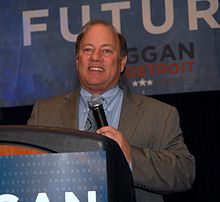Mayor Mike Duggan, heading into his 2016-17 budget presentation before the City Council on Thursday, said today that he’s concerned about the long-term impact of a $491-million pension shortfall that threatens ballooning payments to the city’s two pension funds in 2024.
Speaking to the media after he addressed the Detroit Regional Chamber’s Detroit Policy Conference at Motor City Casino, Duggan said there’s no question that extra tens of millions of dollars a year the city will have to pay to the pension funds could cut into reinvestment efforts aimed at improving critical city services such as public safety and blight removal.
“There’s no question that the money has to come from somewhere, and so what is the proper blending? Duggan told reporters. He said the city is running ahead of budget for the year — with a projected $34- million surplus — that gives the city a cushion.Duggan: City will deal with its $490M pension shortfall
Duggan said Detroit’s population decline is slowing, people are moving back into the city, and property values are rising significantly in a majority of Detroit’s neighborhoods. If that trend continues, he said, it will generate enough revenue in property taxes so that the city can pay to upgrade public services and meet its pension obligations.
Duggan said the bankruptcy was supposed to have settled the city’s shortfalls in paying into the Police and Fire Retirement System and the General Retirement System, but an actuarial consultant for the pension plans now estimates the funds will be $491 million short, leading to higher payments than expected beginning in 2024. The consultant, Gabriel, Roeder, Smith, said bankruptcy consultants used outdated life expectancy tables — estimates on how long retirees will live to collect their pensions — in projecting the city’s total pension obligation.
Duggan said the city now plans to manage the problem with additional payments instead of dealing with a crisis in 2024. Detroit is now looking to hire a consultant to verify the pension plan shortfall and determine the best way to pay for it.
“Our job is to try to figure out how to fill the hole, and that’s what we’re focused on,” Duggan said.
He said the city ultimately may end up making even larger payments to cover the shortfall in 2017 and subsequent years, or continuing payments in years where the the city’s long-term budget calls for lowering them.
“We’re just really disappointed that we came out of bankruptcy having been told — and everybody was told in the grand bargain — the pension shortfall was solved, and now it appears it was not,” Duggan said.
The grand bargain he was referring to was the deal in which the State of Michigan, charitable foundations and the Detroit Institute of Arts pledged the equivalent of $816 million to reduce cuts to city pensioners in exchange for sparing the museum from having to sell art in Detroit’s bankruptcy.
The mayor’s comments came a day ahead of his budget presentation to the City Council, set for 10 a.m. Thursday at city hall. Duggan wouldn’t discuss details of the next estimated $1-billion city general fund budget ahead of the presentation to the council except to say the city will post its second annual budget surplus in a row.
Contact Matt Helms: 313-222-1450 or mhelms@freepress.com. Follow him on Twitter:@matthelms.


